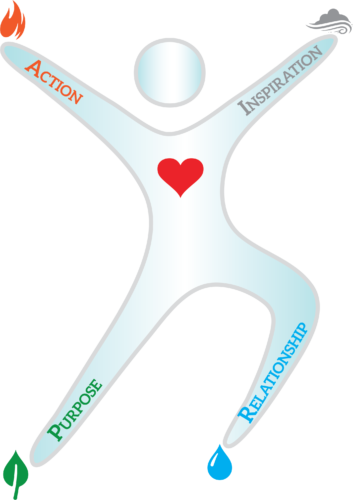Purpose
The rock and foundation of any organization is the grounding purpose with which it leads. If there’s confusion in your company, siloing, and a lack of cohesion about how to move forward toward a common goal, you will struggle to attract the right people, opportunities, and clients.
When you have that clear vision and committed leadership, you have the fundamental element of success.
The Elements of Adventure: Empowering Leaders, Igniting Results, Changing the World is a framework that aligns with your human-centric values and helps you achieve the most aggressive business goals and community impact. It uses the elements of earth, water, air, and fire as the framework for success to combat the pressing issues of confusion, isolation, apathy, and inertia. Each element typically attracts the attention of a specific role within the organization. The CEO understands the power of purpose and will be drawn to the solutions provided in this area of the system.
The initial article on the Elements of Adventure signature program provides an overview of the entire program. However, a deeper dive into each element and its unique focus and contribution to the whole is necessary.
Today, let’s jump into the EARTH element and the strategies of PURPOSE. ![]()
Challenge
Without a compelling purpose, the company may struggle to differentiate itself in a competitive job market, making it challenging to attract and retain talented individuals. Disconnection from a company’s mission leads to a lack of motivation and engagement that affects job satisfaction and performance. It infects the energy in a way that screams out “stay away” to top talent.
Without a clear purpose that employees can not only buy into, but also connect to their own mission, they’ll struggle to see the broader impact of their work. A distinct and well-communicated purpose serves as a guiding light at all levels of the organization. Without it, decision-making may lack a unified direction, leading to confusion and additional poor choices.
The lack of ability to differentiate with purpose does more than impact employees. It confuses potential customers and halts current customer loyalty.
Choice
You get to choose. Having a strong purpose attracts customers and generates loyalty. That purpose will foster a deeper connection to your target audience. And will even illuminate who they are and how to find them if you haven’t done this work before. Everything is clearer. For you and for your customers.
We’ve conducted a tremendous amount of research and have found a correlation between purpose and business results. Examples will be found in our upcoming Humanity of Sales book.
A few popular examples for our intentions here are:
- Delta’s company purpose and culture revolves around supporting the communities where it lives, works, and serves and is consistently recognized for excellence in everything from passenger experience to customer service, operational performance to workplace culture.
- One of the first national restaurant brands to commit to using only responsibly raised meat, Chipotle believes that food has the power to change the world.
- Black Rifle Coffee Company is committed to supporting veterans, law enforcement, and first responders and they give back to them with every purchase.
- Research from Deloitte underscores the importance of conscious consumerism for millennials in particular, with 42% saying they started or expanded a relationship with a business because their products or services were positively impacting the world.
I could go on with many other examples of purpose driven systems and initiatives, but instead let’s shift toward what YOU can do.
Suggestions as you refine and pursue Purpose:
- Purpose should initiate from values and connect those values to a bigger vision.
- Look at where you are and where you want to go and recognize that there may be beliefs you have about both that need to be addressed.
- Remember that it’s not enough to have a strong purpose. It must be consistently well-communicated.
- Asking for feedback will help initiate buy in.
- You can achieve any ‘how’ if you have a strong enough ‘why’- Connect to the emotion of your why.
Change
The world isn’t what it was. It’s faster, more confusing, and ever-changing. We need to keep up and even drive change. Creating a clear, solid foundation that keeps you steady when uncertainty strikes will help.
A clear purpose provides stability and guidance during times of change. Without it your people and the company as a whole may struggle to successfully navigate organizational restructuring, market shifts, new product launches, or any of the transitions common to business today.
In general, and especially during change, a lack of common purpose intensifies individual needs at the expense of the team. Find the balance between honoring the individual and fostering the common good. If you understand the importance of self-leadership and discover how the diversity of the individual contributes to the bigger team/company/community purpose, it can all fall into place.
The fifth ‘element’ in the Elements of Adventure process is the heart of humanity. ❤️
 There will be an article focusing on this in the series but it’s important to mention it here because of how strongly it ties into purpose.
There will be an article focusing on this in the series but it’s important to mention it here because of how strongly it ties into purpose.
Leading from the inside out involves the ability to cultivate and expand the aspects of your own humanity as a leader. What is possible for your team, organization, clients, and community exponentially expands when you look at the impact you can make on something bigger than profit.
And oddly in the end, purpose driven companies find that the profits always follow.
Speaking of what follows…next in our series of articles about each individual element is WATER and the power of flow in communication and more meaningful relationships.
Quote of the Day:
“Purpose is the place where your deep gladness meets the world’s needs.” – Frederick Buechner





